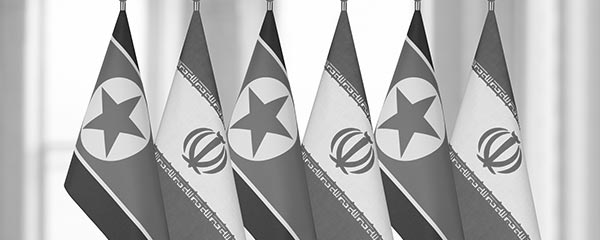WASHINGTON, D.C. -- In his acceptance speech at this year's Republican National Convention, President Donald Trump mentioned China 16 times, far more than any other country. "China would own our country if Joe Biden got elected," Trump predicted, effectively declaring it the United States' chief adversary.
A week later, Joe Biden had similarly tough words for Russia. Citing intelligence reports on Russian interference in the election, he said, "I just want to make it clear. I believe that any country that engages in any activity to delegitimize or impact on American elections is in direct violation of our sovereignty." Biden has also been critical of China, and, according to The Wall Street Journal, has grown more hawkish on it. But thus far, Biden has not spoken of China in terms that suggest it poses an existential threat.
Americans themselves aren't clear on which global power the U.S. ought to be most worried about. Gallup routinely asks Americans to name what they think is the country's greatest enemy and finds Russia and China essentially tied as Americans' highest-ranking concerns, while Iran is a close third.
| Feb 2008 | Feb 2018 | Feb 2020 | |||||||||||||||||||||||||||||||||||||||||||||||||||||||||||||||||||||||||||||||||||||||||||||||||
|---|---|---|---|---|---|---|---|---|---|---|---|---|---|---|---|---|---|---|---|---|---|---|---|---|---|---|---|---|---|---|---|---|---|---|---|---|---|---|---|---|---|---|---|---|---|---|---|---|---|---|---|---|---|---|---|---|---|---|---|---|---|---|---|---|---|---|---|---|---|---|---|---|---|---|---|---|---|---|---|---|---|---|---|---|---|---|---|---|---|---|---|---|---|---|---|---|---|---|---|
| % | % | % | |||||||||||||||||||||||||||||||||||||||||||||||||||||||||||||||||||||||||||||||||||||||||||||||||
| Russia | 2 | 19 | 23 | ||||||||||||||||||||||||||||||||||||||||||||||||||||||||||||||||||||||||||||||||||||||||||||||||
| China | 14 | 11 | 22 | ||||||||||||||||||||||||||||||||||||||||||||||||||||||||||||||||||||||||||||||||||||||||||||||||
| Iran | 25 | 7 | 19 | ||||||||||||||||||||||||||||||||||||||||||||||||||||||||||||||||||||||||||||||||||||||||||||||||
| North Korea/Korea | 9 | 51 | 12 | ||||||||||||||||||||||||||||||||||||||||||||||||||||||||||||||||||||||||||||||||||||||||||||||||
| Iraq | 22 | 2 | 7 | ||||||||||||||||||||||||||||||||||||||||||||||||||||||||||||||||||||||||||||||||||||||||||||||||
| Gallup | |||||||||||||||||||||||||||||||||||||||||||||||||||||||||||||||||||||||||||||||||||||||||||||||||||
This dispersion reflects the post-Cold War reality that the United States still lacks a clear rival. At the end of the Cold War, with the collapse of the Soviet Union and the U.S. preeminent, there was concern in the foreign policy community that, without a common enemy left, America's ascendency could result in a loss of a sense of purpose for its grand strategy.
What has evolved in the 21st century is that America is facing not one, but two, ambitious rivals in Russia and China. Both challenge the U.S. in different ways, as they work to grow their chosen spheres of influence.
Consistent with Americans' perceptions, Business Insider columnist, Tom Porter, wrote at the beginning of 2020 that the biggest threats to the U.S. were: 1) Russia, with its interference in elections and its expanding weapons programs; 2) the Middle East, where tension between Iran and the U.S. are at a boiling point, the consequences of which are still unclear; and 3) China, whose leaders are gearing up their bid to strengthen the might of the PLA and expand China's influence beyond its borders.
Porter also saw that Democrats and Republicans were not able to agree on which power might serve as America's "orienting enemy." Samuel Huntington, in his famous 1997 book, The Clash of Civilizations, voiced that any weakening of the U.S. sense of a common enemy would create a lack of policy cohesion for the U.S.
Different Threats for Different Parties
It's not just Trump and Biden who are emphasizing different threats, but Republicans and Democrats nationwide. Gallup's February poll found Republicans about three times more likely to name China than Russia as the United States' greatest enemy, and the reverse was true among Democrats.
Despite the emergence of the coronavirus pandemic and all that has since changed in the world, partisan differences in views of China continued in a Pew study conducted June 16-July 14, with Republicans (83%) viewing it more unfavorably than Democrats (68%).
The picture wasn't so fractured two years ago when Republicans and Democrats agreed that North Korea posed the greatest threat. At that time, Trump and North Korean leader Kim Jong Un were trading verbal threats, and North Korea displayed the potential of its ballistic missiles to reach the U.S. But Americans' fear diminished after Trump's summit with Kim in 2019. Also, in 2008, Republicans and Democrats agreed on the Middle East as the greatest threat, selecting either Iran or Iraq.
| Republicans | Independents | Democrats | ||||||||||||||||||||||||||||||||||||||||||||||||||||||||||||||||||||||||||||||||||||||||||||||||||
|---|---|---|---|---|---|---|---|---|---|---|---|---|---|---|---|---|---|---|---|---|---|---|---|---|---|---|---|---|---|---|---|---|---|---|---|---|---|---|---|---|---|---|---|---|---|---|---|---|---|---|---|---|---|---|---|---|---|---|---|---|---|---|---|---|---|---|---|---|---|---|---|---|---|---|---|---|---|---|---|---|---|---|---|---|---|---|---|---|---|---|---|---|---|---|---|---|---|---|---|---|
| % | % | % | ||||||||||||||||||||||||||||||||||||||||||||||||||||||||||||||||||||||||||||||||||||||||||||||||||
| 2020 Feb 3-16 | ||||||||||||||||||||||||||||||||||||||||||||||||||||||||||||||||||||||||||||||||||||||||||||||||||||
| Russia | 9 | 22 | 43 | |||||||||||||||||||||||||||||||||||||||||||||||||||||||||||||||||||||||||||||||||||||||||||||||||
| China | 31 | 23 | 12 | |||||||||||||||||||||||||||||||||||||||||||||||||||||||||||||||||||||||||||||||||||||||||||||||||
| Iran | 30 | 16 | 11 | |||||||||||||||||||||||||||||||||||||||||||||||||||||||||||||||||||||||||||||||||||||||||||||||||
| North Korea/Korea | 10 | 12 | 15 | |||||||||||||||||||||||||||||||||||||||||||||||||||||||||||||||||||||||||||||||||||||||||||||||||
| Iraq | 6 | 7 | 5 | |||||||||||||||||||||||||||||||||||||||||||||||||||||||||||||||||||||||||||||||||||||||||||||||||
| 2018 Feb 1-10 | ||||||||||||||||||||||||||||||||||||||||||||||||||||||||||||||||||||||||||||||||||||||||||||||||||||
| Russia | 9 | 19 | 30 | |||||||||||||||||||||||||||||||||||||||||||||||||||||||||||||||||||||||||||||||||||||||||||||||||
| China | 15 | 11 | 7 | |||||||||||||||||||||||||||||||||||||||||||||||||||||||||||||||||||||||||||||||||||||||||||||||||
| Iran | 10 | 7 | 3 | |||||||||||||||||||||||||||||||||||||||||||||||||||||||||||||||||||||||||||||||||||||||||||||||||
| North Korea/Korea | 58 | 50 | 45 | |||||||||||||||||||||||||||||||||||||||||||||||||||||||||||||||||||||||||||||||||||||||||||||||||
| Iraq | 1 | 1 | 2 | |||||||||||||||||||||||||||||||||||||||||||||||||||||||||||||||||||||||||||||||||||||||||||||||||
| 2008 Feb 11-14 | ||||||||||||||||||||||||||||||||||||||||||||||||||||||||||||||||||||||||||||||||||||||||||||||||||||
| Russia | 2 | 3 | 1 | |||||||||||||||||||||||||||||||||||||||||||||||||||||||||||||||||||||||||||||||||||||||||||||||||
| China | 19 | 14 | 12 | |||||||||||||||||||||||||||||||||||||||||||||||||||||||||||||||||||||||||||||||||||||||||||||||||
| Iran | 39 | 24 | 16 | |||||||||||||||||||||||||||||||||||||||||||||||||||||||||||||||||||||||||||||||||||||||||||||||||
| North Korea/Korea | 7 | 8 | 13 | |||||||||||||||||||||||||||||||||||||||||||||||||||||||||||||||||||||||||||||||||||||||||||||||||
| Iraq | 16 | 22 | 27 | |||||||||||||||||||||||||||||||||||||||||||||||||||||||||||||||||||||||||||||||||||||||||||||||||
| Gallup | ||||||||||||||||||||||||||||||||||||||||||||||||||||||||||||||||||||||||||||||||||||||||||||||||||||
Commenting on the United States' current first-tier rivals, Reihan Salam, President of the Manhattan Institute, wrote, "Nationalist conservatives and Republicans see rising China as the far greater threat to American interests, but cosmopolitan liberals and Democrats see a Russia that will serve America as their chief geopolitical adversary." (The Atlantic, "Is China or Russia America's Defining Rival?" Oct. 9, 2018).
Bottom Line
The 2019 Worldwide Threat Assessment delivered by the U.S. Director of National Intelligence laid out for the 2020 election cycle the harmful actors to U.S. interests. The report stated that Russia's intelligence services would, among other things, seek to "erode U.S. democracy, undermine U.S national policies and foreign relationships, and increase Moscow's global position and influence." The report also assesses that China's intelligence services will "exploit the openness of American society, especially academia and the scientific community using a variety of means."
Nearly a quarter of Americans share each of these concerns, identifying either China or Russia as the greatest threat to the U.S. The more Trump mentions China, the more Biden may feel compelled to emphasize Russia to stoke his own base, which has expressed more concern about Russia than China. Thus, even with COVID-19 and the economy uppermost in people's minds, a close 2020 election may be won over whether voters believe it is more important to face down Russia or China.
Even if it's not crucial to the vote, the U.S. now has antagonistic relations on multiple fronts, with partisans in Washington and nationwide disagreeing on priorities, contributing to a lack of foreign policy cohesion. What direction U.S. foreign policy takes over the next four years will likely depend upon which political party is in power -- not only because Trump and Biden approach the question differently, but because their political bases agree. As the old saying goes, "Elections have consequences," and this is certainly the case for this election and U.S. foreign policy.




